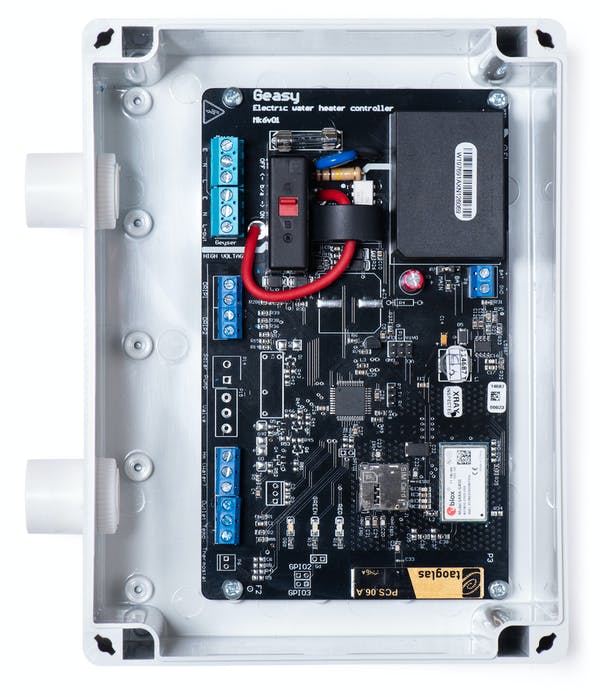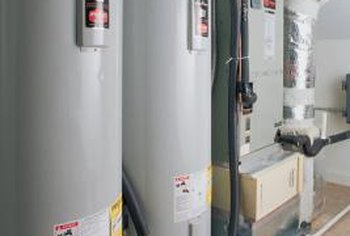Smart water heating could help
energy crisis has many dimensions, from political and economic to technical and environmental. Recently, the country’s power utility, Eskom, has been generating only about 60% of its capacity and has had to restrict usage to prevent a regional blackout
new chief executive officer has affirmed the importance of demand management to handle the crisis. But his approach of merely “subsidising energy-efficient lightbulbs” won’t cut it. The country needs drastic interventions – and the elements of the fourth industrial revolution are available to make this possible. These are: wireless connectivity, the internet of things, big data analysis, machine learning, artificial intelligence and intelligent centralised control.
What tends to be overlooked is that these water heaters are perfect for storing thermal energy. They absorb electrical energy when heating water, and discharge thermal energy later when the hot water is used, with little loss in between. This makes them well suited for flattening the grid’s morning and evening demand peaks. Centrally switching them on during off-peak times would distribute demand for electricity more evenly through the day.
The benefits of scheduling heaters don’t stop there though. Our research has shown that the energy they guzzle, and the resulting emissions, can be significantly reduced too by applying optimal scheduling
Two thorny issues compete with demand and energy management in water heating. One is customer satisfaction. The most energy-efficient and demand-optimal water heater is one that is never turned on, but who wants a cold shower?

Gas vs. Electric Water Heaters: Which Is More Energy-Efficient?
Other than equipment costs, you might not have thought too much about selecting a water heater. But, to get hot-water heater energy savings, there are some factors to consider before you purchase. For example, what size water heater do you need? What types of hot-water heaters are there? And how should water heater energy use be factored into your decision-making?
Understanding water heater energy usage
Most of us turn on the faucet and don’t pay much attention to how the hot water arrives — until, of course, it doesn’t. We tend to take the hot-water heater in our homes for granted.
But ignoring your hot-water heater might mean passing up an opportunity to gain some hot-water heater energy savings. Water heater energy usage makes up about 18% of the average utility bill, after all. You can find hot-water heater energy savings a few different ways. But knowing how to choose a hot-water heater that’s energy-efficient from the beginning is the best way to lower your energy costs from the first time that heater kicks on.
How to choose a hot-water heater
First, some basics for selecting a water heater. A single-family tank water heater has a reservoir of hot water ranging from 20 to 80 gallons. When someone turns on the hot-water faucet, the hot water is released from the top of the tank and piped to where it’s needed in the house. The hot water in the tank is replaced with cold water entering the bottom of the tank to ensure the tank is always full.
Determine the type of fuel source in your home.
The fuel source that powers your home can help you decide which type of hot-water heater to get. Although some homes are fitted for natural gas, 1 in 4 U.S. homes is all electric. Additionally, those living in rural areas may have difficulty accessing natural gas. If your home is limited to just electricity, the choice between an electric vs. gas water heater has been made for you unless you’re willing and able to put in a gas line.
Water heater repair
Water heaters are a tricky business. Water heater tech’s do not always require the same technical training or licensing as plumbers and other contractors. It is also sometimes difficult to distinguish between a company simply on the hunt to sell water heaters instead of repair them. It is important to carefully select a water heater repair service for your home needs.
Here are things to consider before you hire a water heater repair service:
Avoid Door-to-Door Representatives – You get a knock at the door, and someone wearing a uniform tells you they need to check your water heater. If you let them, they will likely tell you the water heater is old and inefficient and should be replaced, even if that’s not true. You should not invite door-to-door salesmen into your home; there are much better ways to find a reliable water heater repair company.
Reputation – The internet allows you to easily find out which water heater repair companies have the best reputations. By checking water heater repair services out online, you are able to access customer reviews and ratings. It is advisable to check with the Better Business Bureau for complaints, as well.
Certification – While they do not require the same amount of technical training as other contractors, water heater repair service technicians still require certification. It is important to check their certification before allowing them to repair or replace your water heater.
Experience – Experience is extremely important when it comes to water heater repair. Generally, the more experienced the technician, the higher the quality of the work.
Price – At the end of the day, price is always a deciding factor. However, it shouldn’t be the only factor—you should be very wary of a company that gives you an estimate that seems too good to be true. You will probably end up paying more in the long run to fix their poor-quality work or to repair or replace the water heater again just a few short months or years later.
Off Grid Water Heater: The Ultimate Guide
When building an off grid lifestyle, there are comforts of modern day living that we just do not want to give up. On-demand hot water is one of the fundamentals that we have grown accustomed to; we feel it is a necessity for life as we know it.
Not too long ago in humanity’s history, hot water was a nicety that was only used for cooking and for the occasional bath. If you wanted a hot bath, you would have to boil water and pour it into a washbasin. I could only imagine how many kids were doused in a tub of cold water!
My appreciation for hot water began when I moved into a camper full-time. We were on a 6-gallon hot water heater which allowed for maybe 5 minutes of hot water. I had grown accustomed to 30 minute luxurious steamy showers where I could daydream and shave my legs at my leisure.
This really got me thinking about how we can manage to have continuous hot water in an off grid scenario. As you know me by now, I have spent hours of research building this very article to provide you with the best ways you can build an off grid water heater system so you can enjoy modern day living without being connected to a municipal water and heating source.
The Methodology of an Off Grid Water Heater
The essence of being off grid is to be independent from municipal sources. Being free from monthly utility bills and providing your home with your own energy is the foundation of living the off grid lifestyle. There are two commodities that you will need for your off grid water heater: energy for heat and water.

How Much Does It Cost To Repair A Water Heater?
Hot Water Heater Repair Cost
The national average cost to repair a water heater is $573. The typical range for repairs is $217 and $931, though homeowners have spent as little as $100 and as much as $1,300.
There is nothing worse than waking up on a frigid winter morning to a cold shower because the water heater that is on the fritz, or worse, has completely died! Conventional water heaters are relatively simple and straightforward in the way that they operate, so there are only a few things that can malfunction. Cold water enters the tank and is heated by an electric element or gas burner. As the water heats, pressure builds inside the tank. When you turn on a tap, pressure sends hot water out of the faucet. Problems could be as simple as a pilot light that has gone out, a circuit breaker that has tripped, or a thermostat that is broken. The average thermostat replacement cost is between $100 and $300. Most other repairs are equally affordable.
There are two main types: gas and electric. A gas unit works by way of a gas flame while an electric one works using electric elements, or coils. The two types have similar life spans and repair costs. A gas one will cost more to install and replace, though it won’t use as much energy over time as an electric unit. Here are a few things to consider when faced with the cost of repairing or replacing your water heater.
Gas Water Heater Repairs
Gas models will have issues that are unique to their power source. The three most frequent problems are with the pilot light, the thermocouple, and the gas control valve. To figure out the root of your problem, a professional will need to troubleshoot each element as they go. Plumbers charge $45 to $150 per hour and the most common issues with gas units cost between $150 and $500 to fix. Some of these repairs can be done without a professional, but only if you follow instructions and secure your gas line. Before you relight a pilot light or perform repairs on your own, make sure that you are comfortable working with gas and that there aren’t strong gas smells around your unit. If there is a strong gas odor, call a professional and address the problem as soon as possible.
Pilot Light Assessment and Reignition Cost
One of the most common problems with gas units is the pilot light going out. There may be no need for repairs, if this is the case. It could be that it was blown out or that your unit temporarily lost its gas connection. If you follow safe procedures, you can relight this component on your own. This would save you a service call fee, which could range from $45 to $150 per hour. If it doesn’t light, you could have thermocouple or valve issues.